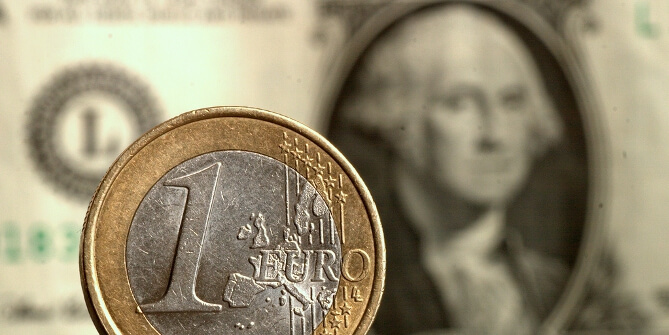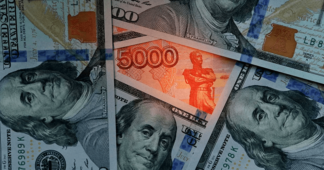Mar. 1, 2022
The US again intensified its financial squeeze on Russia by freezing the assets of Russia’s central bank, only two days after the country, along with some of its allies, announced it would drive selected Russian banks out of the international payment and settlement system SWIFT. The move was made to exert pressure on Russia amid the Russia-Ukraine military conflict, as Western countries gradually upgraded their financial sanctions against Russia in what experts called an “unprecedented” manner.
But experts said that Russia’s possible countermeasures, including the use of central bank digital currency (CBDC) reserves, could help Moscow withstand the sanctions.
The US Department of the Treasury announced on Monday that it was prohibiting US citizens from engaging in transactions with the Central Bank of the Russian Federation, which is tantamount to freezing of the bank’s assets in the US. In addition, the new measures will also target the National Wealth Fund of the Russian Federation and the Ministry of Finance of the Russian Federation.
Some of the US’ allies have moved to follow suit. The EU has placed sanctions on 26 more Russians, while the UK also announced it was banning residents from engaging in financial transactions involving Russia’s central bank, according to media reports.
Economists acknowledged that such sanctions will bring some problems to Russia’s financial markets, which have already seen intense fluctuations in recent days. The ruble plunged by 21 percent against the US dollar on Monday, but climbed by 12.85 percent on Tuesday as of press time. The country’s stock exchange, the Moscow Exchange, was closed this week.
Lin Jiang, a professor of economics at Sun Yat-sen University, said that the main impact this round of financial sanctions will have on Russia is that the country won’t be able to channel its foreign exchange reserves deposited at overseas banks into Russia, thus immobilizing a powerful tool to prop up the ruble while it is under severe pressure of depreciation.
“If the ruble is left to plunge, it will frighten away investors, whether domestic or abroad, causing capital to flee Russia and triggering inflation risks,” Lin told the Global Times on Tuesday.
Data provided by Xu Wenhong, deputy research fellow under the Institute of Russian, East European & Central Asian Studies under the Chinese Academy of Social Sciences, showed that by the end of February 18, Russia’s central bank had about $643 billion of foreign reserves, of which $311 billion is stored in the form of overseas securities, while $152 billion was deposited in overseas banks. Russia also had about $132 billion in gold reserves.
“If the US and EU freeze Russia’s foreign reserves, it would reduce Russia’s ability to interfere with the ruble’s exchange rate through foreign reserves, and the ruble might face another drop,” Xu said.
However, experts insisted that Russia has its own way of coping with such challenges, and that the country’s economic fundamentals are unlikely to be shaken as a result of such financial sanctions.
One reason is that Russia faced similar financial sanctions before in 2014, such as the freezing of assets of certain Russian companies and suspension of certain Russian bank cards, which caused similar financial market reactions as Russia has seen recently. However, it did not undermine Russia’s economy then, with the latter’s various countermeasures ranging from government aid to major enterprises and the legalizing of offshore capital returning to Russia.
“The scale and strength of this round of new financial sanctions is unprecedented, but since some of those measures were already implemented in around 2014, the recent measures are just a kind of expansion and upgrading of what Western countries did before. I think Russia might have already figured out ways to deal with them,” Xu told the Global Times.
Some of those coping methods have already been released. For example, the Kremlin recently ordered a ban on foreign exchange loans and transfers by Russian residents to outside the country.
Elvira Nabiullina, the Russian central bank chief, was also quoted as saying recently that because of Russia’s own financial messaging system SPFS, which replaces SWIFT, the Russian financial infrastructure will run smoothly in the current environment, according to Russian media.
The Bank of Russia also doubled the country’s benchmark interest rate to 20 percent from 9.5 percent. The policy seems to have been effective in stabilizing the currency, as the ruble climbed against the greenback on Tuesday.
Chen Jia, a research fellow under the International Monetary Institute of Renmin University, told the Global Times that one method Russia could adopt is using CBDC to bypass the US-led payment system.
Chen also noted that Russia will take into consideration the credibility of US sanctions, as driving of Russia out of SWIFT would have a serious impact on other member countries, while nurturing competitors for SWIFT.
Song Kui, president of the Contemporary China-Russia Regional Economy Research Institute, also told the Global Times that Russia’s ample resources, some of the most abundant in the world, could support its economy in facing these external challenges, he said.
China on Tuesday reaffirmed its call for solving the Russia-Ukraine tensions through peace talks, saying that it would support and encourage any diplomatic efforts to solve the Ukraine crisis peacefully.
Wang Wenbin, spokesperson of the Chinese Foreign Ministry, said during a press conference on Tuesday that China hopes Russia and Ukraine can continue with the process of negotiations and search for a political solution that is beneficial to Europe’s long-term peace and stability, and seek to accommodate the security concerns of both sides while achieving Europe’s unified safety.
Published at www.globaltimes.cn
We remind our readers that publication of articles on our site does not mean that we agree with what is written. Our policy is to publish anything which we consider of interest, so as to assist our readers in forming their opinions. Sometimes we even publish articles with which we totally disagree, since we believe it is important for our readers to be informed on as wide a spectrum of views as possible.










